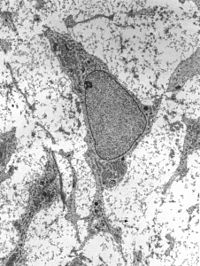
Photo from wikipedia
Abstract Osteoarthritis (OA) is the most common type of arthritis among adults, which is associated with cartilage breakdown. Chondrocytes are the only type of cell in articular cartilage that secrete… Click to show full abstract
Abstract Osteoarthritis (OA) is the most common type of arthritis among adults, which is associated with cartilage breakdown. Chondrocytes are the only type of cell in articular cartilage that secrete extracellular matrix (ECM). Therefore, to prevent and manage the occurrence of arthritic cartilage, it is important to consider approaches to increase the survival of chondrocyte cells. The production of reactive oxygen species (ROS), the release of pro-inflammatory cytokines (e.g. interleukin-1β (IL-1β)), and cartilage calcification play an imperative role in OA pathophysiology. Nicotinamide adenine dinucleotide phosphate (NADPH) oxidase 4 (Nox4) is an enzyme that regulates the production of ROS in chondrocyte cells. ROS and cytokines lead to ECM degradation and chondrocyte apoptosis. Moreover, the matrix γ-carboxyglutamic acid (Gla) protein (MGP) acts as a decalcification agent in chondrocytes, which can inhibit the pathogenic mineralisation of cartilage. The correct balance of nutrients may potentially have a protective effect against OA. In the present study, the effect of essential nutrients on Nox4 activity in chondrocyte cells, chondrocyte viability, and MGP expression was investigated. Chondrocyte cells were pre-treated with the nutrients, and the cells were subsequently assessed for Nox4 activity using the chemiluminescence technique. It was found that the production of ROS significantly decreased after preincubation in the presence of nutrients in comparison to the control samples. Furthermore, it was found that the presence of nutraceuticals improved the viability of chondrocyte cells and the expression of MGP, which acts as a mineralisation inhibitor in the chondrocyte growth plate. The results of this study suggest that the correct balance of key nutrients at the molecular level plays an essential role in supporting chondrocyte cells and promoting cartilage decalcification.
Journal Title: Biocatalysis and agricultural biotechnology
Year Published: 2021
Link to full text (if available)
Share on Social Media: Sign Up to like & get
recommendations!